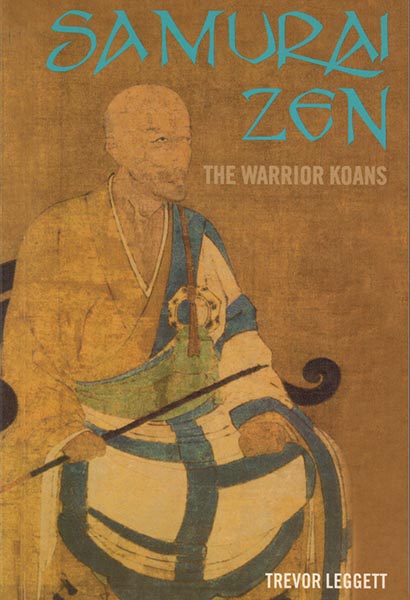Samurai Zen: The Warrior Koans

Book description
Samurai Zen;The Warrior Koans unites 100 of the rare riddles representing the core spiritual discipline of Japan’s ancient samurai tradition. Unlike the classical Chinese koan riddles, the Japanese koans used incidents from everyday life – a broken tea cup, a water jar, a cloth – to bring the warrior pupils of the samurai to the Zen realization. Their aim was to enable a widening of consciousness beyond the illusions of the limited self, and a joyful inspiration in life – a state that has been compared to being free under a blue sky after imprisonment.
Paperback published by Routledge
ISBN 0415284651
Price £18.99
eBook published by Routledge
ISBN 0203380614
Price £17.09
Book extract
No. 44. WIELDING THE SPEAR WITH HANDS EMPTY
(Imai’s note: Nanjo Masatomo, a master of the spear, was at Kenchoji to worship, and afterwards spoke with priest Gio about using a spear on horseback. Gio said,’Your Honour is indeed well versed in the art of the spear. But until you have known the state of wielding the spear with hands empty, you will not penetrate to the ultimate secret of the art.’ Nanjo said, ‘What do you mean?’ The teacher said, ‘No spear in the hands, no hands on the spear.’ The spear master did not understand. The teacher said further, ‘If you don’t understand, your art of the spear is a little affair of the hands alone.’)
In December of 1256 Fukuzumi Hideomi, a government official, was given the koan ‘wielding the spear with hands empty’. He wrestled furiously with this without being able to attain the state, and one evening he paced to and fro many times between the outer hall of Kenchoji and the approach to the teacher’s room, until he was exhausted. He quietly crept into a little grotto near the hall, and repeated again and again ’empty hands, empty hands (kara-te, kara-te)’. However a monk who was doing a punishment sitting (to sit all night in meditation posture for having broken a monastery rule) overheard Hideomi when in his meditation he said ‘kara-te, kara-te’, and thought it was ‘kane-dase, kane-dase (give some money, give some money)’. He thought it was a robber and raised the alarm. The priest with the office of jikijitsu and others made a quick search round the hall, and caught Hideomi.
At that time Hideomi was very ill with tuberculosis of the lungs, and moreover in his absorption with the koan, he had forgotten to eat for several days, so that his flesh was wasted and his bones weak, and his body on the verge of death. The jikijitsu Chiko hit him on the back and said, ‘Let not this heart be set on any place’, and gave a Katzu! shout.
Hideomi nodded, and then quietly died.
TESTS
(1) How is it, to wield a spear with hands empty?
(2) What has the phrase about not setting the heart got to do with the empty hands koan?
This became a koan with the interviews of Kosen, the 38th teacher at Kenchoji.